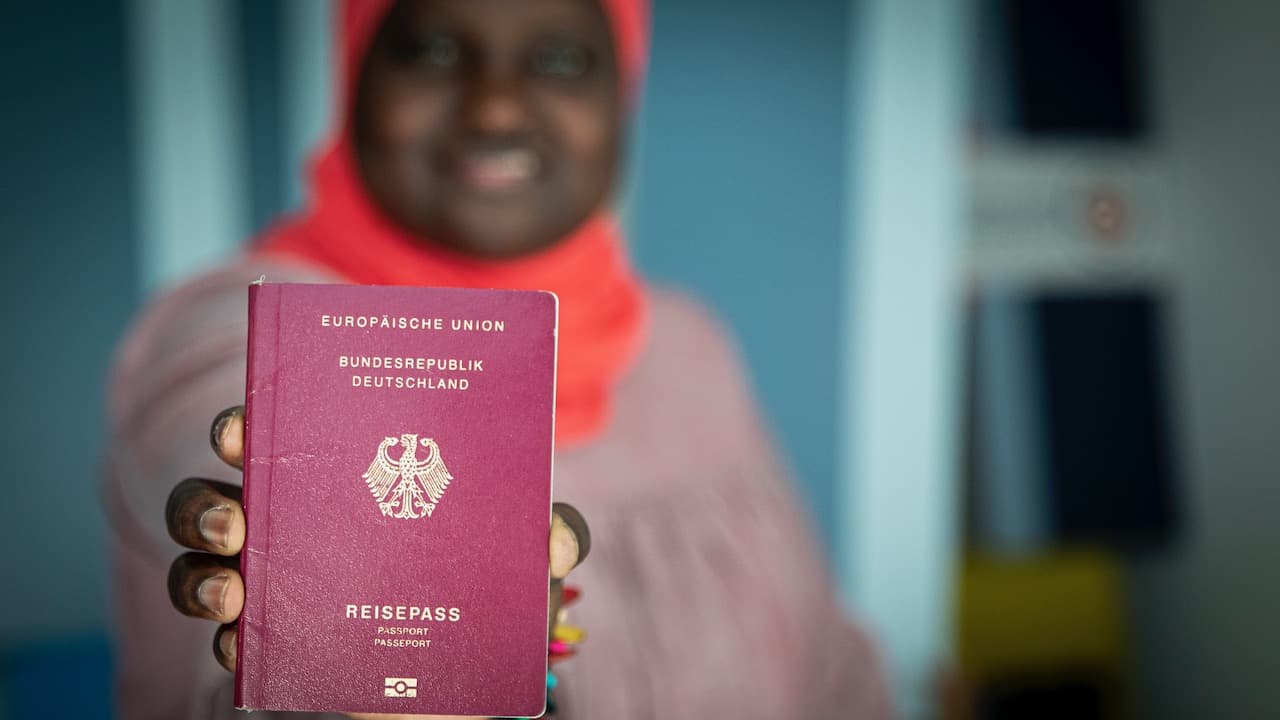Permanent Residence Permit for Refugees
Can I stay in Germany permanently?
If you came to Germany as a refugee and have been issued a residence permit for political or humanitarian reasons, upon fulfilment of certain pre-conditions, you can apply for a permanent residence permit (“Niederlassungerlaubnis”) after at least 5 or (in special cases) 3 years.
A permanent residence permit allows you to reside in Germany without having to extend your residence permit regularly. With a permanent residence permit, you may also choose to live anywhere within Germany, as residence restrictions will no longer apply.
In addition to the German permanent residence permit, there is also an EU permanent residence permit. With an EU permanent residence permit, you have the possibility of obtaining additional residence permits from other EU-countries. You can learn more in our chapter "EU permanent residence permit ".
If you are in Germany as a skilled worker or hold an EU Blue Card, you may be able to obtain a permanent residence permit under simplified conditions. You can find out more in our chapter on "Permanent Residence Permits".
What requirements do I have to meet?
I am a recognised refugee or person entitled to asylum
As a recognised refugee or individual entitled to asylum, you must meet the following requirements to obtain a permanent residence permit:
- You have a residence permit in accordance with Section 25 (1) Residence Act, Section 25 (2) Sentence 1, 1st Alternative Residence Act or Section 23 (4) Residence Act.
- You must have had your residence permit for at least 5 years or, in special cases, 3 years. The time it took your asylum procedure to conclude is also included.
- You must be able to speak German at the A2 level and provide proof of your language proficiency. If you want to apply for a permanent residence permit 3 years after your arrival in Germany, you must speak German at the C1 level.
- You may receive little or no benefits from the jobcenter or social welfare office, which means you have to be able to cover most of your expenses independently or with your spouse's support. The permissible percentage of welfare support you can receive from the Jobcentre or Social Welfare Office varies from one federal state to another, but In principle, it is at least 50% to 75%. For more information, you can seek advice from the staff at the Immigration Office or a counselling centre. If you want to apply for a permanent residence permit after 3 years, the requirements for securing a livelihood are stricter.
- You must have enough living space for your family. The flat's size requirements vary from one federal state to another. Your home must be big enough for your family. In principle, you need 12 square meters per family member aged 6 and over. For children under 6 years old, 10 square meters is enough. Babies up to 2 years of age are not included. In exceptional cases, a flat can be a little smaller. You can ask the staff at the Immigration Office or seek help from a counselling centre if you need more information in this regard.
- You must either have statutory health insurance or adequate private health insurance coverage. You can find out more about health insurance on our topic page “Health insurance”.
- You must have successfully completed the orientation course.
- You must not have a criminal record, and your records must not contain anything that violates public safety and order. The gravity of the offence or violation is a major factor here—if the authorities reject your application due to an offence, it can help to ask a lawyer for advice.
- The grounds for your recognition as an individual entitled to protection should still stand, so BAMF cannot revoke your recognition or advise the Immigration Office that there are grounds for protection.
I am entitled to subsidiary protection
If you have been entitled to subsidiary protection, to obtain a permanent residence permit, you have to fulfil further requirements:
- You must have had a residence permit for at least 5 years.
- You cannot receive benefits from the Job Centre or the Social Welfare Office. However, you can receive child benefits, supplement child benefits (“Kinderzuschlag”), the so-called “Erziehungsgeld”, “Elterngeld”, maintenance advance (“Unterhaltsvorschuss”) or educational support (“Ausbildungsförderung”), for instance.
- You should be able to speak German at the B1 level and provide the proper certificates.
- You must have contributed to pension insurance ("Rentenversicherung") for at least 60 months.
- You must have enough living space for your family. The flat's size requirements vary from one federal state to another. Your home must be big enough for your family. In principle, you need 12 square meters per family member aged 6 and over. For children under 6 years old, 10 square meters is enough. Babies up to 2 years of age are not included. In exceptional cases, a flat can be a little smaller. You can ask the staff at the Immigration Office or seek help from a counselling centre if you need more information in this regard.
- You must either have statutory health insurance or adequate private health insurance coverage. You can find out more about health insurance on our topic page “Health insurance”.
- You must have successfully completed the orientation course.
- You must not have a criminal record, and your records must not contain anything that violates public safety and order. The gravity of the offence or violation is a major factor here—if the authorities reject your application due to an offence, it can help to ask a lawyer for advice.
- The grounds for your recognition as an individual entitled to protection should still stand, so BAMF cannot revoke your recognition or advise the Immigration Office that there are grounds for protection.
I have been issued a ban on deportation
As a person who has a so-called “Abschiebungsverbot“, you need to meet the following requirements to obtain a permanent residence permit:
- You must have had your residence permit for at least 5 years. In the case of a ban on deportation, the time spent in the asylum procedure is taken into account if immigration authorities choose to grant you a permanent residence permit (“Ermessensniederlassung”).
- You cannot receive benefits from the Job Centre or the Social Welfare Office.
- You should be able to speak German at the B1 level and provide the proper certificates.
- You must have contributed to pension insurance ("Rentenversicherung") for at least 60 months.
- You must have enough living space for your family. The flat's size requirements vary from one federal state to another. Your home must be big enough for your family. In principle, you need 12 square meters per family member aged 6 and over. For children under 6 years old, 10 square meters is enough. Babies up to 2 years of age are not included. In exceptional cases, a flat can be a little smaller. You can ask the staff at the Immigration Office or seek help from a counselling centre if you need more information in this regard.
- You must either have statutory health insurance or adequate private health insurance coverage. You can find out more about health insurance in our chapter on “Health insurance”.
- You must have successfully completed the orientation course.
- You must not have a criminal record. There must be nothing against public safety and order in your records. The gravity of the offence or violation is a major factor here– if the authorities reject your application due to an offence, it can help to ask a lawyer for advice.
- The grounds for your recognition as an individual entitled to protection should still stand, so BAMF cannot revoke your recognition or advise the Immigration Office that there are grounds for protection.
I have a tolerated stay permit (“Duldung”)
In principle, you cannot obtain a permanent residence permit - however, there are some possibilities for those who have a tolerated stay permit to obtain a residence permit after a few years. You can learn more about it in our chapter "Residence Permits for Individuals with Duldung". After you hold a residence permit for a few years, you can also apply for and obtain a permanent residence permit. You can learn more about the general requirements for a permanent residence permit in our chapter "Permanent Residence Permit".
Important: If you currently have a tolerated stay permit for training or “Ausbildungsduldung”, check out the requirements for a residence permit for tolerated persons according to §16g. You can find out more about this form of residence permit in our chapter “Ausbildungsduldung”. The time with this residence permit counts towards what’s required for a permanent residence permit.
What else do I need to know?
Where and how can I apply for a permanent residence permit?
You must apply for the permanent residence permit in writing at the Immigration Office responsible for you. You will find the form "Application for the Permanent Residence Permit" ("Antrag auf Erteilung der Niederlassungserlaubnis") on the website of the immigration office. You have to send the filled application form, a biometric passport photo and the following documents to the responsible Immigration Office per post or submit them in person:
- A copy of your passport
- A copy of your employment contract, your last 6 payslips, and a recent confirmation letter in which your employer verifies that you are still employed there. This confirmation must not be older than 14 days. If you are self-employed: your last tax assessment and an audit report are completed by a tax accountant.
- A recent confirmation from your health insurance company verifying that you are insured.
- A copy of your rental agreement
- A copy of your German language certificates
- Your pension information from the German pension insurance scheme (Deutschen Rentenversicherung), if you have subsidiary protection.
- If you receive child benefit, parental allowance or alike: the relevant confirmation letters
- The confirmation of your registration with the police
Keep in mind that you have to pay in order to obtain a permanent residence permit.
As soon as the Immigration Office has checked your application, they will notify you in writing.
Could I lose my permanent residence permit?
Yes- if the following applies to you, you may lose your permanent residence permit:
- If you have been granted a permanent residence permit based on your recognition as a refugee or your entitlement to asylum, subsidiary protection or national ban on deportation- travelling to your home country may lead to the revocation of your protection status. You have a better chance of keeping your permanent residence permit if you are considered to be “well-integrated”; i.e., your German is good, you have a job and have been in Germany for some time. Please note: The Immigration Office makes this decision on a case-by-case basis (§52 Residence Act).
- If you do not reside in Germany for more than 6 months or move to another country, in principle, you will lose your permanent residence permit (§ 51 I Residence Act). Your residence permit remains valid if you are recognised as a refugee by the BAMF and hold a valid travel document from a German authority (in accordance with Section 51 (7) Residence Act).
- Your permanent residence permit may be revoked if you have obtained it as a result of providing false information to the authorities.
- If you are considered to be a threat to public safety and order, you may be deported. In this case, you will also lose your permanent residence permit. If you are at risk of losing your recognition or residence permit, you can seek advice from a counselling centre or lawyer. You can find lawyers and counselling centres in your area on our Local Information page. There you can enter the name of the city where you live and search for advice on asylum, right of residence or other legal issues.
Where can I find advice and support?
You can seek specialised advice from Migration Advice for Adults (MBE) or the Youth Migration Service (JDM). The counselling centres of the Youth Migration Service (JDM) are specially designed for youth and young adults (under the age of 27). The staff there speak many languages- and their service is free of charge. The Refugee Council in your federal state can also support you– you will find their office in your area on the National Refugee Council website. The refugee councils can link you to specialised counselling centres or lawyers. Their service is free of charge.
Important
Refugees are NOT allowed to travel to their home country even after obtaining a permanent residence permit. If you do so, you may lose your status and your permanent residence permit.
Similar topics
Additional links
Local Counselling Centres
Find a Pro Asyl counselling office in your city.
The Legal Advisory Conference
Here is a list of lawyers specialising in immigration law and refugee rights.
Our community in the forum
Quickly find answers to any question. Benefit from the experience of your community and exchange ideas.
Support on site
Are you looking for counseling centers, meeting points, and other services? Use our search engine.









